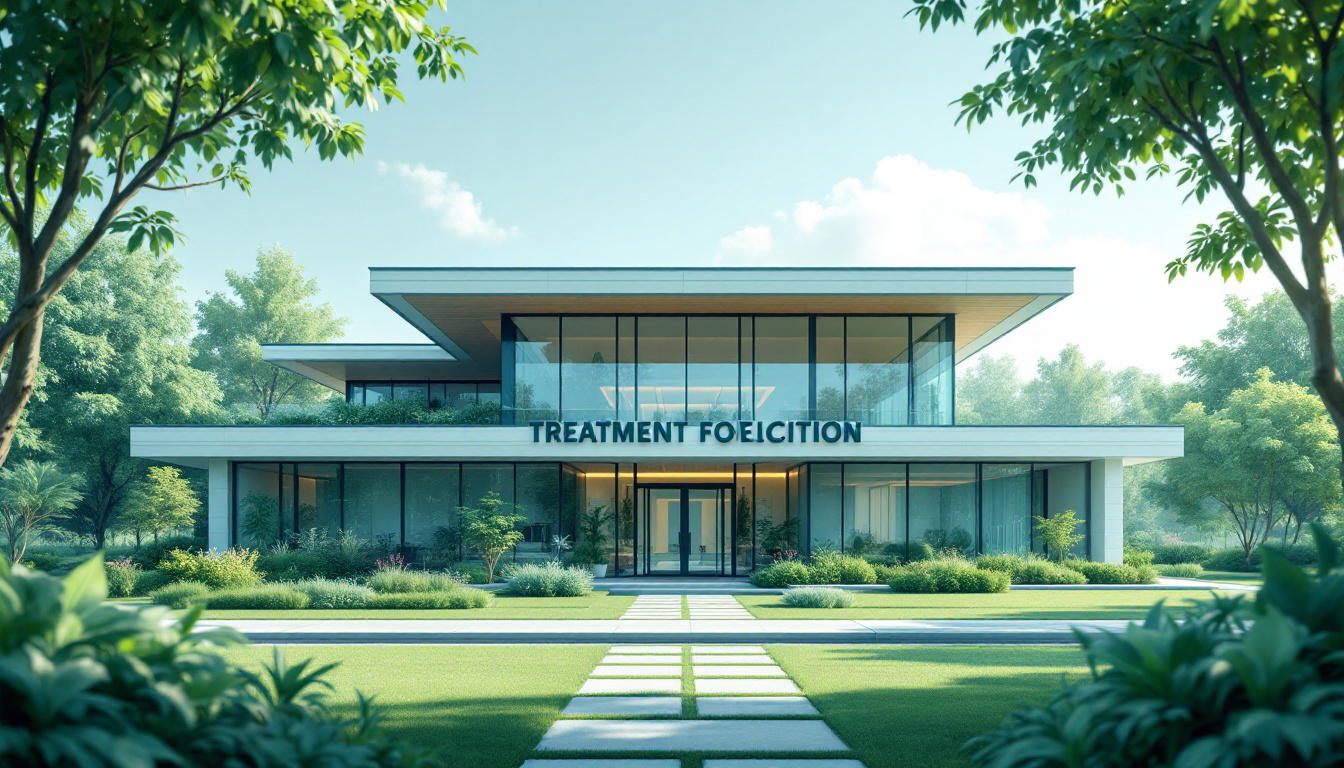Understanding Two Types of Treatment Centers
With the rising concern over substance use and addiction, understanding the types of treatment facilities available is crucial for those seeking help. While often used interchangeably, substance use treatment centers and addiction treatment centers offer unique services that cater to specific needs in the recovery process. This article aims to clarify the distinctions between these centers, detailing the treatment options, target populations, and methodologies used to effectively support recovery and sustain sobriety.
Defining Substance Use and Addiction
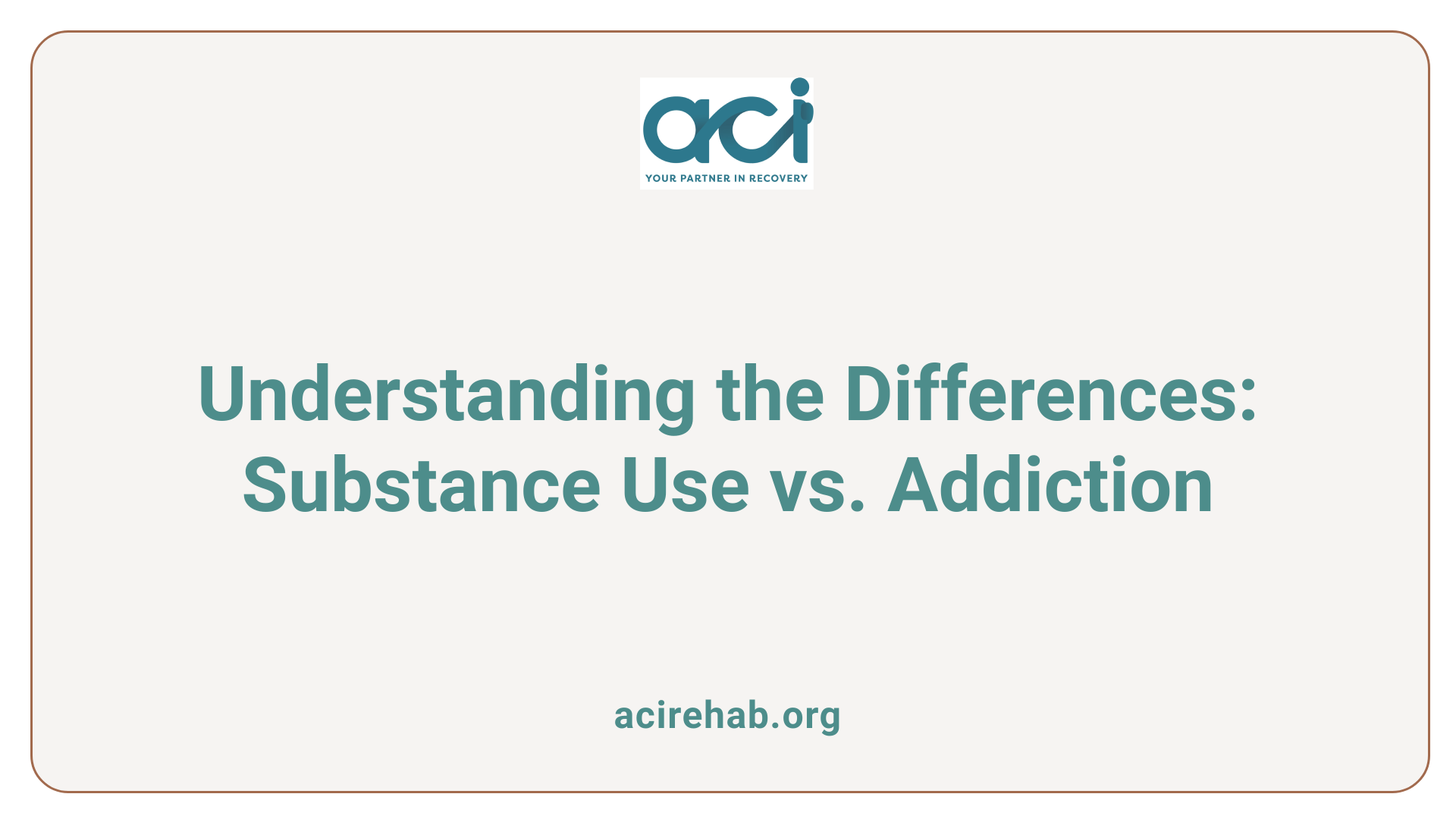
What is the difference between substance use and addiction?
Substance use involves the consumption of drugs or alcohol, which can take place in various contexts, from casual social drinking to harmful usage. Notably, while substance use can predispose individuals to negative outcomes, it does not always lead to serious issues. On the other hand, substance abuse denotes the harmful use of substances, marked by negative consequences that impact the individual’s life, including health risks and legal issues.
Addiction, however, is a more severe condition characterized by an uncontrollable compulsion to use substances despite the associated negative effects. This compulsive behavior arises from alterations in brain chemistry, classifying addiction as a chronic disease. The consequences of addiction can be far-reaching, affecting education, employment, and personal relationships.
Treatment approaches for both substance abuse and addiction commonly involve counseling, aimed at helping individuals recognize their behaviors and develop effective coping strategies. While substance abuse can lead to addiction, it is critical to understand that not every instance of substance use will evolve into this more significant disorder.
| Aspect | Substance Use | Addiction |
|---|---|---|
| Definition | Consumption of drugs/alcohol | Compulsive need for substances |
| Severity | Can be casual or harmful | Characterized by chronic dependence |
| Treatment Focus | Counseling and behavior modification | Comprehensive treatment approaches |
| Risks | Potential for abuse and health issues | Severe health risks and social consequences |
| Impact | Short-term effects | Long-term damage to various life domains |
Comparing Treatment Approaches
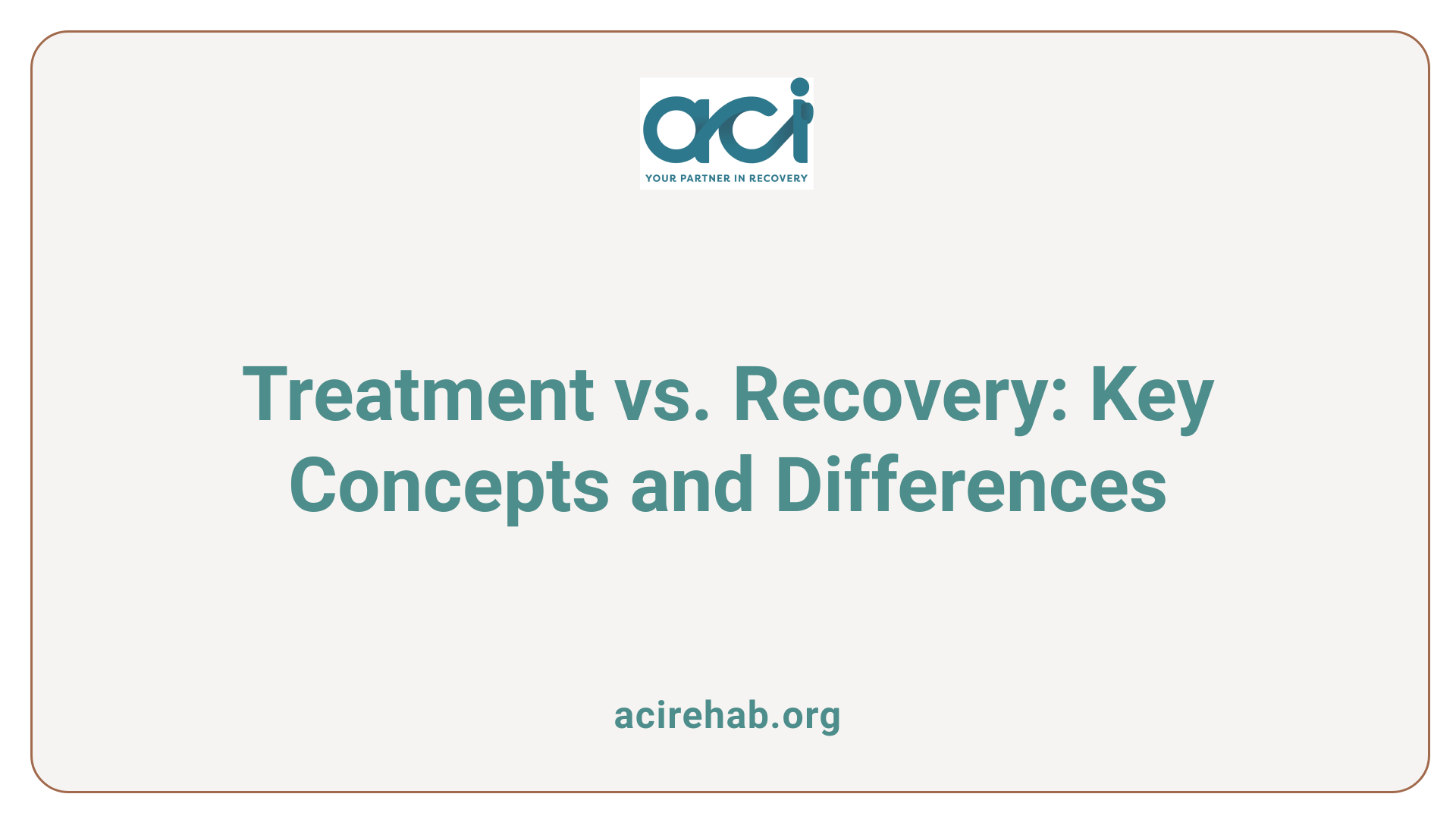
Definitions of treatment and recovery
Treatment and recovery are interconnected yet distinct concepts in the context of addiction. Treatment refers to the formal process of engaging in programs designed to address substance use disorders, such as detoxification, inpatient or outpatient care, and medication-assisted treatment (MAT). Essentially, it provides a structured environment aimed at helping individuals overcome addiction.
In contrast, recovery is a broader, lifelong journey that focuses on emotional, mental, physical, and spiritual well-being. Recovery goes beyond the formal treatment setting and encompasses the ongoing process of personal growth, the development of coping skills, and maintaining sobriety, often aided by support groups or therapy.
What is the difference between treatment and recovery?
Although treatment lays the groundwork for sobriety, recovery embodies the persistent effort to maintain it. Here’s how they differ:
| Treatment | Recovery |
|---|---|
| Formal, structured programs | Lifelong journey focusing on personal growth and well-being |
| Involves detox and therapies | Involves support groups, community, and self-help strategies |
| Focuses on overcoming addiction | Emphasizes sustaining sobriety and continuous self-improvement |
| Duration is often predefined | Is ongoing and shaped by individual experiences |
Role of treatment in the recovery journey
The role of treatment in the recovery journey is facilitating initial change. Effective treatment sets up individuals for success by addressing immediate substance-related issues and establishing a foundation for further development.
Through intensive support and care, treatment programs offer crucial strategies to cope with the challenges of addiction. This early phase is vital as it prepares individuals to embark on their unique recovery paths, fostering resilience and a commitment to sobriety that must continue long after formal treatment ends.
Types of Treatments Available
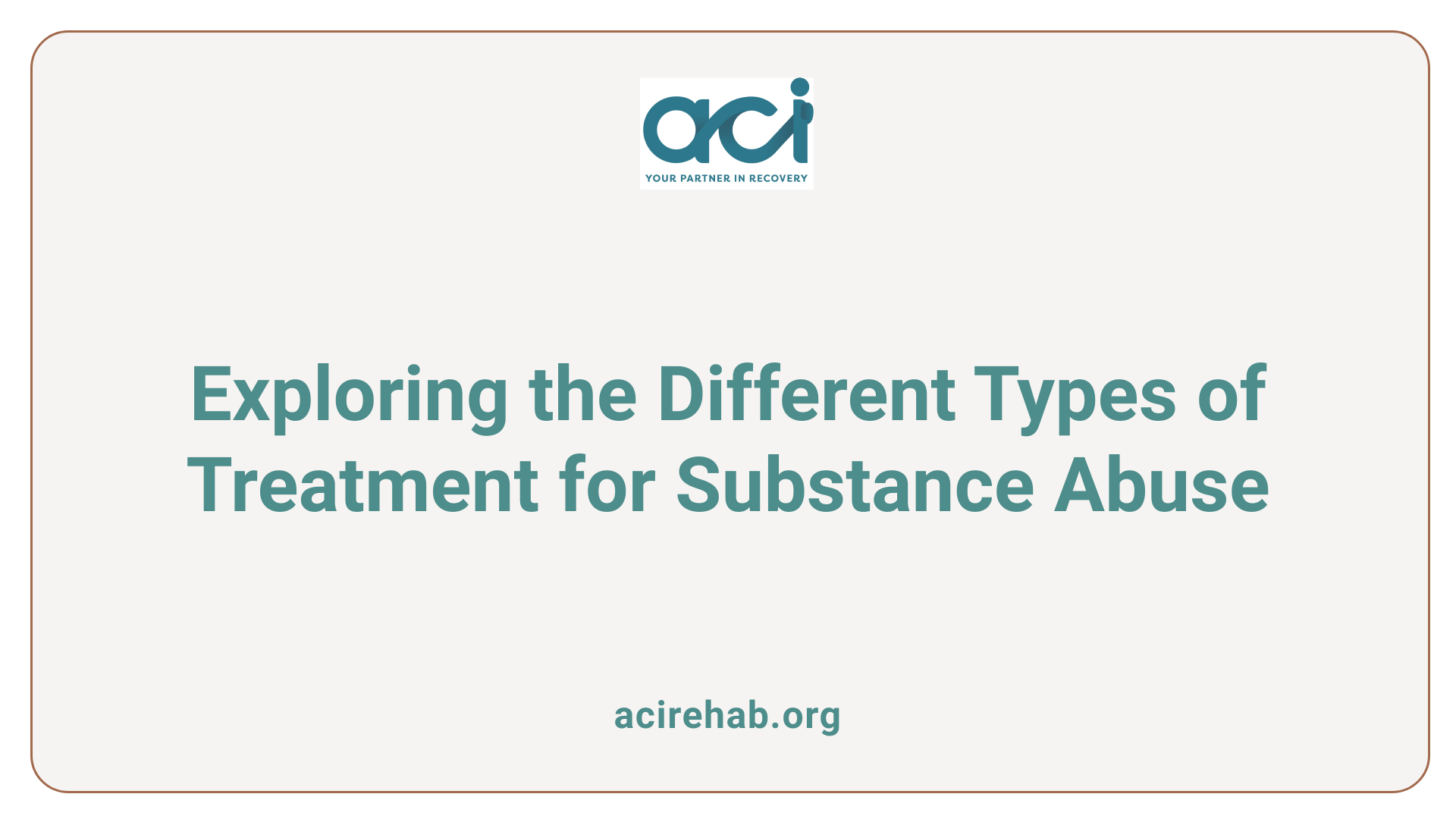
What are three types of treatments for substance abuse?
Three types of treatments for substance abuse include outpatient treatment, inpatient treatment, and residential care.
-
Outpatient Treatment: This option allows individuals to attend appointments and participate in therapy while returning home the same day. It is particularly suitable for those managing personal responsibilities such as work or school, making it a flexible choice for ongoing recovery. Typically, this type of program involves fewer hours per week compared to inpatient programs, allowing patients to balance treatment with daily activities.
-
Inpatient Treatment: Providing a higher level of care, inpatient treatment is set in a hospital or clinic environment where individuals stay overnight for several days or weeks. This setting is ideal for more severe substance use disorders, offering round-the-clock medical and emotional support. The intensive nature of inpatient programs ensures a focus on rehabilitation and detoxification, with structured schedules that include therapy sessions conducted by licensed professionals.
-
Residential Care: Similar to inpatient treatment, residential care involves living full-time at a treatment facility for a duration that can range from several weeks to months. It emphasizes comprehensive support and rehabilitation, enabling individuals to reintegrate into their communities positively. The environment is often more comfortable than traditional inpatient settings, focusing on long-term recovery and lifestyle changes.
| Type of Treatment | Level of Care | Description |
|---|---|---|
| Outpatient Treatment | Low to moderate | Flexible, allows for maintaining daily responsibilities while attending therapy. |
| Inpatient Treatment | High | Intensive, 24/7 care in a hospital-like environment for serious cases. |
| Residential Care | High | Full-time living at a rehab facility with focus on long-term recovery. |
These treatments can include therapies like Cognitive Behavioral Therapy (CBT) and medication management, further supporting recovery efforts. In addition, accreditation from reputable organizations such as the Joint Commission can enhance the credibility of these programs, ensuring that standards are upheld in the treatment process.
Detox vs. Rehabilitation: Understanding the Difference
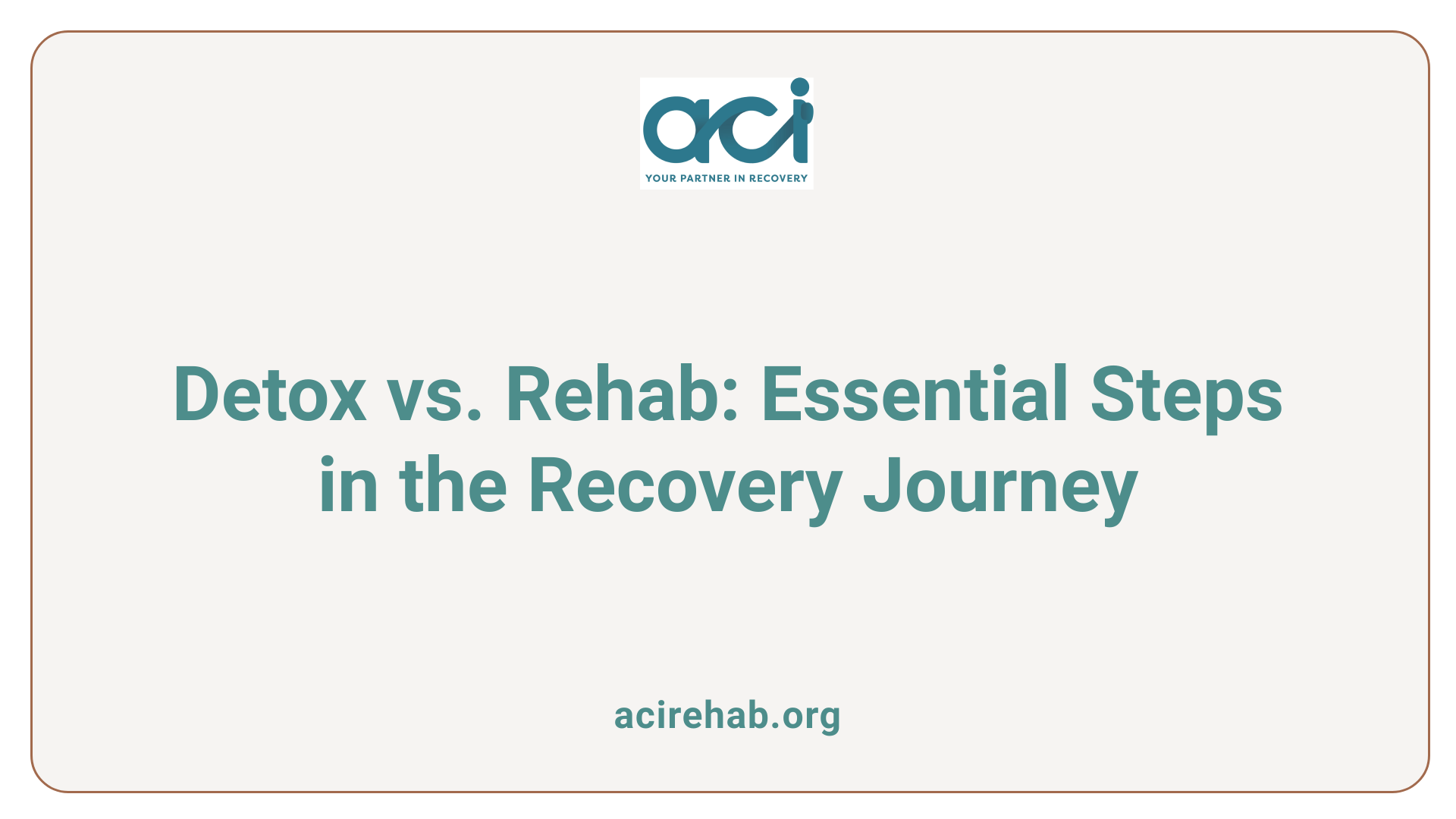
Role of detox in addiction treatment
Detoxification, often referred to as detox, is an essential initial step in the treatment of substance use disorders. It involves the medically supervised process of clearing addictive substances from the body while managing withdrawal symptoms.
- Withdrawal Symptoms: These can range from mild to severe and may include mood changes, nausea, and muscle aches. Some substances, like alcohol, can lead to potentially dangerous symptoms, necessitating close medical supervision.
- Duration and Environment: Detox typically occurs in a dedicated facility, ensuring 24/7 medical support. The process sets the stage for further treatment, helping patients prepare for rehabilitation.
Difference between detox centers and rehab centers
Detox centers and rehab centers serve different purposes in the recovery journey.
| Detox Centers | Rehab Centers |
|---|---|
| Focus on medical detoxification | Focus on behavioral therapy and support |
| Limited to withdrawal management | Comprehensive treatment for recovery |
| Typically short-term stays (<1 week) | Longer-term stays (30 days to 6 months) |
| 24/7 medical supervision | Structured therapy sessions and activities |
Importance of rehab following detox
Completing detox is crucial, yet it’s only the beginning of the recovery process. Rehabilitation centers come in to provide the therapeutic support needed to address the root causes of addiction.
- Therapeutic Approaches: Rehab offers therapies like cognitive-behavioral therapy (CBT) and group counseling, targeting psychological aspects and fostering coping skills.
- Ongoing Support: After detox, rehabilitation aids in developing an actionable recovery plan and offers continued support through aftercare programs, significantly enhancing long-term recovery success.
In conclusion, while detox focuses on the immediate physical needs of an individual facing addiction, rehab is where the journey towards holistic recovery truly begins.
Inpatient and Outpatient Services: A Comparative View
Characteristics of inpatient treatment
Inpatient treatment programs are designed for individuals facing severe substance use disorders. These residential settings offer round-the-clock medical and emotional support, creating a structured environment for recovery. Patients receive intensive care tailored to their needs, with lengths of stay typically ranging from 30 days to 6 months. The surrounding environments can vary from hospital-like settings to more comfort-oriented facilities, ensuring that individuals receive comprehensive care alongside constant medical oversight.
Flexibility of outpatient services
Outpatient treatment provides individuals with the flexibility to maintain their daily activities, such as work or school, while attending therapy part-time. It includes structured schedules of partial hospitalization programs, offering 5-6 hours of treatment per day for 5-6 days a week, and intensive outpatient programs with about 3 hours of treatment for 3-5 days a week. This approach supports a balanced lifestyle, enabling patients to integrate recovery with everyday responsibilities.
Who benefits from each type
Inpatient treatment is ideal for those with severe addiction issues requiring intensive support, while outpatient services cater to individuals with milder substance use problems or those transitioning from inpatient care. Customized treatment plans ensure that each patient’s specific needs are met, enhancing their chances of a successful recovery. Understanding these differences allows individuals to make informed choices regarding their treatment paths.
Role of Accreditation and Standards in Treatment Centers
Importance of Accreditation from Bodies Like Joint Commission and CARF
Accreditation by recognized organizations such as the Joint Commission and CARF is vital for substance use disorder treatment centers. These accreditations ensure that facilities meet stringent industry standards and performance benchmarks, which enhances trust and legitimacy in their services.
Ensuring High-Quality Care Through Standards
High-quality care is underscored by adherence to well-defined standards. Accredited centers often utilize evidence-based practices, integrate mental health services, and employ licensed practitioners, including LADC and LPC. This structured approach fosters a holistic treatment environment that addresses the physical, psychological, and emotional facets of recovery.
Recognizing Reputable Centers
When seeking treatment, verifying accreditation helps distinguish reputable centers from those that may offer subpar services. Facilities governed by the National Association of Addiction Treatment Providers (NAATP) are also held to quality standards, ensuring that only ethical practices are followed. Engaging with accredited providers significantly boosts the odds of successful recovery outcomes.
Multidisciplinary Approaches and Evidence-Based Practices
Role of comprehensive care teams
One of the most effective methods in substance use disorder treatment is utilizing a multidisciplinary approach. This typically involves a team consisting of doctors, psychiatrists, psychologists, counselors, and other addiction specialists. Each member brings a unique perspective, ensuring a holistic treatment plan that addresses the physical, psychological, and emotional dimensions of recovery.
Effectiveness of evidence-based practices
Evidence-based practices (EBPs) like Cognitive Behavioral Therapy (CBT) and Medication-Assisted Therapies (MAT) are crucial in successful treatment outcomes. These approaches are supported by scientific research demonstrating their effectiveness in promoting long-term recovery. The use of EBPs helps centers tailor treatment plans to individual needs, increasing the likelihood of success.
Integration of mental health services
Integrating mental health services into addiction treatment is essential, particularly for those facing co-occurring disorders. A holistic treatment plan that acknowledges both addiction and mental health can significantly enhance recovery outcomes. By addressing these intertwined issues, treatment programs create a comprehensive framework that fosters lasting sobriety and well-being.
Financial Considerations in Choosing Treatment
Importance of insurance compatibility
When exploring treatment options for substance use disorders, understanding insurance compatibility is crucial. Many treatment centers accept certain insurance plans, making it essential for individuals to verify if a facility is in-network with their provider. This can significantly affect out-of-pocket costs and overall affordability of treatment programs. Lack of insurance could lead individuals to seek less quality care due to financial constraints, highlighting the need for accessible, insurance-compliant services.
Recognizing ethical practices in treatment centers
Choosing a reputable treatment center is vital for effective recovery. Look for facilities accredited by organizations like the Joint Commission or the National Association of Addiction Treatment Providers (NAATP). These accreditations ensure that centers adhere to industry standards and ethical practices. Be cautious of centers employing high-pressure sales tactics or lacking thorough health assessments, as these may suggest unethical practices like ‘patient brokering’ — a red flag when seeking professional help.
Avoiding patient brokering
Patient brokering refers to unethical practices where individuals are referred to treatment facilities based on kickbacks rather than their clinical needs. To avoid falling victim to such schemes, potential patients should seek out facilities that prioritize personalized assessments and transparent information about their services. Responsible treatment centers will ask relevant questions about a patient’s health and addiction severity to ensure appropriate care without resorting to deceptive marketing strategies.
Aftercare and Long-term Support
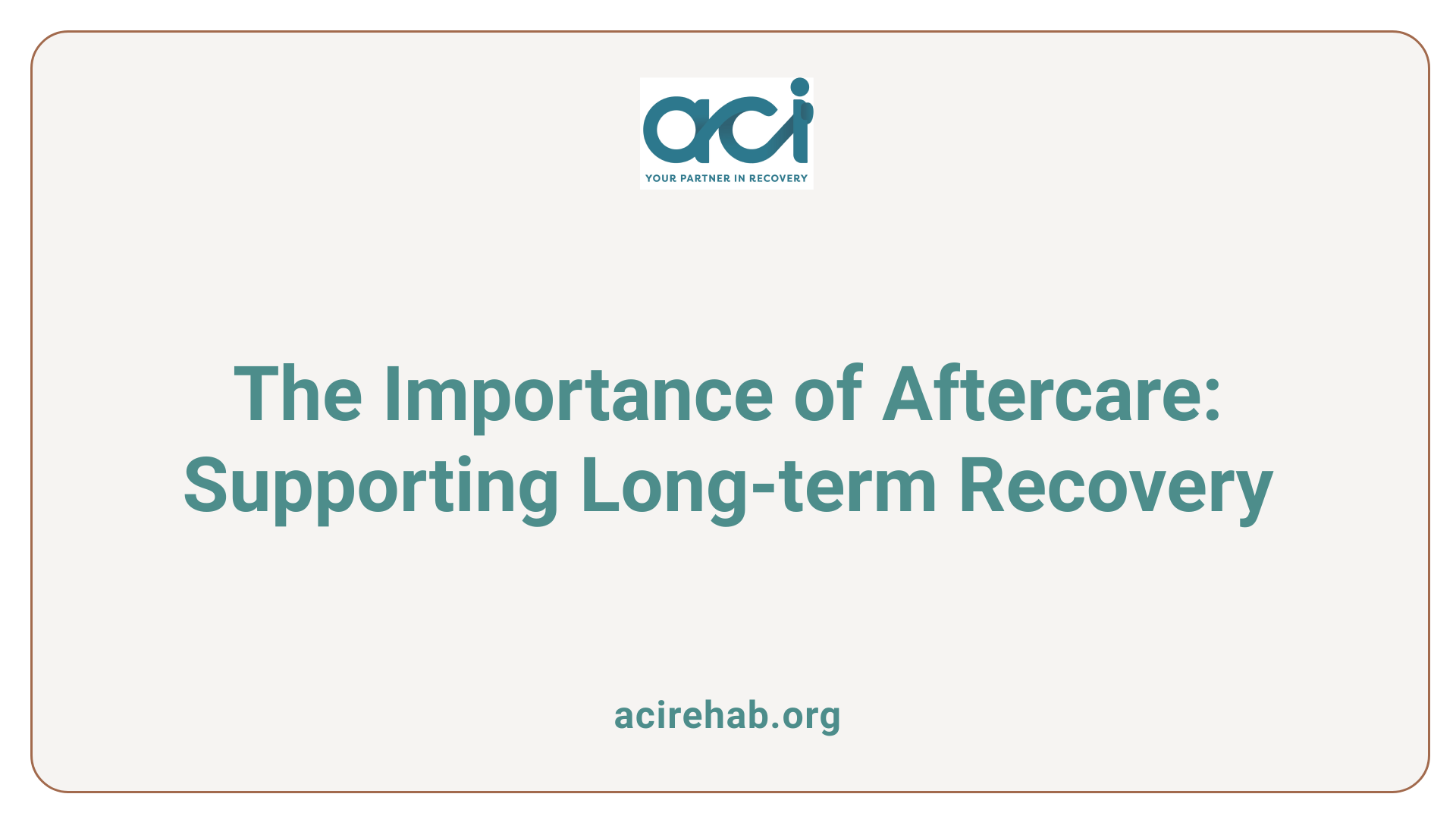
Continuing Care and Its Impact on Recovery
Continuing care, often referred to as aftercare, is integral to achieving sustained recovery from substance use disorders. Post-treatment support can significantly reduce the risk of relapse. Studies indicate that engaging in structured aftercare programs can yield better long-term outcomes for recovery, enhancing individuals’ resilience against triggers and stressors in their lives.
Types of Aftercare Programs
Aftercare can take various forms, often tailored to fit individual needs. Common types include:
- Support Groups: Such as Alcoholics Anonymous (AA) and Narcotics Anonymous (NA), where individuals share experiences and strategies.
- Outpatient Therapy: Continued sessions with therapists or counselors focusing on coping strategies and ongoing treatment.
- Sober Living Houses: Transitional living environments that provide a drug-free space combined with structured support from peers.
These programs foster a sense of community and accountability, which can be vital in maintaining sobriety.
Research on Aftercare Outcomes
Research highlights the importance of aftercare in addiction treatment. Studies suggest that individuals who participate in aftercare programs have higher success rates in maintaining sobriety compared to those who do not. Furthermore, longer durations in aftercare engagement correlate positively with recovery outcomes. Innovative approaches, such as incentives for abstinence and mobile health interventions, are emerging to further enhance patient participation and commitment to recovery.
Thus, aftercare acts as a bridge, ensuring that the skills learned during treatment are applied effectively in real-life situations.
Innovative Treatment Approaches
Use of Technology and New Methodologies
Recent trends in addiction treatment are incorporating technology, such as mobile health applications, which provide continuous monitoring and support. These innovations help practitioners track progress and engage patients with reminders and resources, creating a more interactive treatment experience.
Benefits of Personalized Treatment Plans
Personalized treatment plans are crucial in addressing individual needs. Tailoring interventions ensures that each patient receives the most effective approach based on their unique circumstances, which can significantly enhance recovery outcomes. Facilities frequently assess health severity and personal situations to customize care strategies.
Incentives for Abstinence
A growing trend in treatment centers includes offering incentives for maintaining sobriety. These programs reward individuals for achieving and maintaining milestones in recovery, increasing motivation and engagement. Such strategies have shown promise in improving patient retention and long-term success in addiction treatment.
| Treatment Methodology | Description | Benefits |
|---|---|---|
| Technology Integration (e.g., apps) | Continuous support through digital engagement | Improves patient monitoring and access |
| Personalized Plans | Custom care tailored to individual needs | Enhances recovery effectiveness |
| Abstinence Incentives | Rewards for achieving sobriety milestones | Increases motivation and engagement |
Making Informed Decisions for Recovery
Navigating the world of substance use and addiction treatment can be a daunting task. By understanding the differences between the treatment options available at substance use treatment centers and addiction treatment centers, individuals can make more informed decisions about their care journey. It’s important to consider factors like type of treatment, level of care required, and long-term support mechanisms. Equipping oneself with knowledge about accreditation, evidence-based practices, and ethical standards can enhance the chances of successful recovery. Remember, treatment is just the beginning—recovery is a lifelong journey that requires ongoing effort, support, and commitment.
References
- Inpatient Vs. Outpatient Rehab – Addiction Center
- How to Choose an Addiction Treatment Center – Hazelden Betty Ford
- Detox Centers vs. Rehab Centers | Gateway Addiction Treatment
- How to Choose the Right Place for Alcohol or Drug Rehab – WebMD
- Types of Rehab for Drug and Alcohol Addiction
- Substance Abuse Treatment Centers vs Addiction … – Conifer Park
- Treatment types for mental health, drugs, alcohol – SAMHSA
- Learn About Treatment for Mental Health, Drugs, or Alcohol – SAMHSA
- Provider types for mental health, drugs, alcohol – SAMHSA
- Substance Abuse vs. Addiction | Wake Forest University Online …

